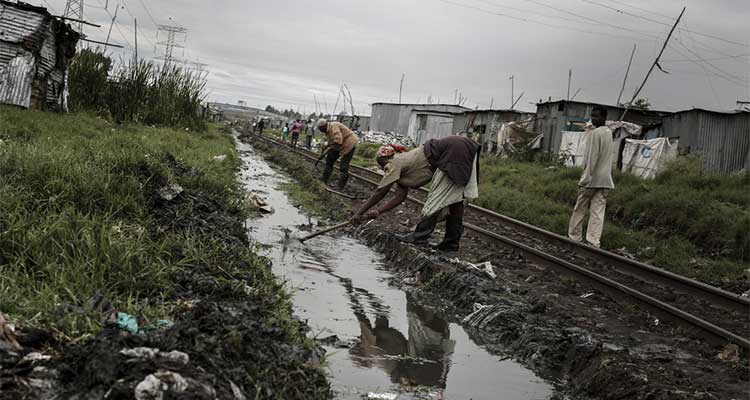Having unmet needs for water, sanitation and hygiene (WASH) not only endangers life, it can negatively affect all aspects of daily existence, and women and girls suffer the most. Editor, Caroline Sweetman, introduces the WASH issue of Gender & Development.
Imagine you’re a teenage girl, dying to go to the loo – but you can’t, until your mother comes home. Without her on guard to take you, you’re not safe, because you don’t have a toilet – just a piece of open wasteland by a railway line, where men hang around and ogle you. When you have your period you use a rag, but you can’t take it outside to dry it when you wash it, because of the shame – and you’re worried you have an infection.
Unmet needs for water, sanitation and hygiene (WASH) are both intensely personal, and profoundly political. They prevent women – society’s carers – from taking jobs, getting education or training, spending time with their families, even sleeping. Women spend hours every day in water collection and purification, taking children to find a safe space to relieve themselves, and caring for people suffering from the diseases they could avoid if they had clean water and sanitation. In their article on Oxfam’s Ebola response, Simone E. Carter, Luisa Maria Dietrich and Olive Melissa Minor focus on women as carers for Ebola patients – a role where the mundane need for water intersects with the rituals of washing at death.
In the UK, Monday used to be ‘Wash Day’ – it took an entire day to do the laundry. Since the 1950s, this drudgery has passed into history for most British women. Men didn’t do this work ever, and it took a great Youtube video a few years ago to show development economists the magical power of a washing machine to emancipatethe female half of the human race. That magic has not happened for women living in poverty, in particular in the rural areas or slums of the global South. And development is not going to help unless we change its course dramatically. On the eve of World Water Day in 2013, more people possessed a mobile phone than a toilet. And this doesn’t mean they are OK with that. It means mobile phones are cheaper than toilets, and you don’t need a spare patch of land or a room to install or use one.
Access to water, sanitation and hygiene can transform women’s lives, by reducing the immense workload associated with unpaid care (the process of recognising it was a challenge in itself, but it was declared a human rights violation by the UN in 2014). The articles in this issue of Gender & Development consider the enormous challenges that need to be overcome in order to meet WASH needs for all. Sustainable Development Goal 6 aims for universal WASH provision by 2030, but there are big questions over how the technical provision of this will be financed, even without considering the accompanying social changes that are needed to realise WASH in an unjust and unequal world.
In their article, Seema Kulkarni, Kathleen O’Reilly, and Sneha Bhat analyze the stories of slum-dwelling women, and offer insights into what the absence of sanitation means for women and girls living in poverty in urban India. What emerges is an understanding of both their individual struggles and the unequal relationships that hold India’s gendered urban sanitation crisis in place, affecting the ability of some slum communities to take collective action to lobby for solutions. Kaveri Thara focuses on the issue of government accountability to women in an article about poor women’s activism in Bangalore, evolving strategies to ensure they continue to get the water they need in a context of ‘cost recovery’ policies evolved without the participation of the poorest water users.
How has the WASH sector responded to women’s interests and needs over the decades? In their article, Julie Fisher, Sue Cavill and Brian Reed explore this, charting progress and the evolution of policy approaches from welfare to empowerment, and beyond, to equalities and inclusion. The idea of designing WASH infrastructure and services with female users in mind is now well-accepted, as is the principle of involving women in water projects and the design of water points and toilet blocks.
More recently, the idea that water projects can be empowering has started to inspire innovative monitoring, learning and evaluation to see if women have benefited, which women, and how. Complex inequalities shape the unmet WASH needs of women, and we need to move beyond targeting ‘women’ as an undifferentiated group, and ‘leave no-one behind’.
Meeting women’s WASH needs also requires work beyond WASH, on gender inequality – and in particular on the stigmas that surround women’s and girls’ bodily functions. Then we’ll be able to menstruate, and talk about it, without feeling shame and needing to ‘hide the evidence’. That will take conversations in communities and families to end stigma and gender inequality. WASH is about power, inequality, and social justice.

